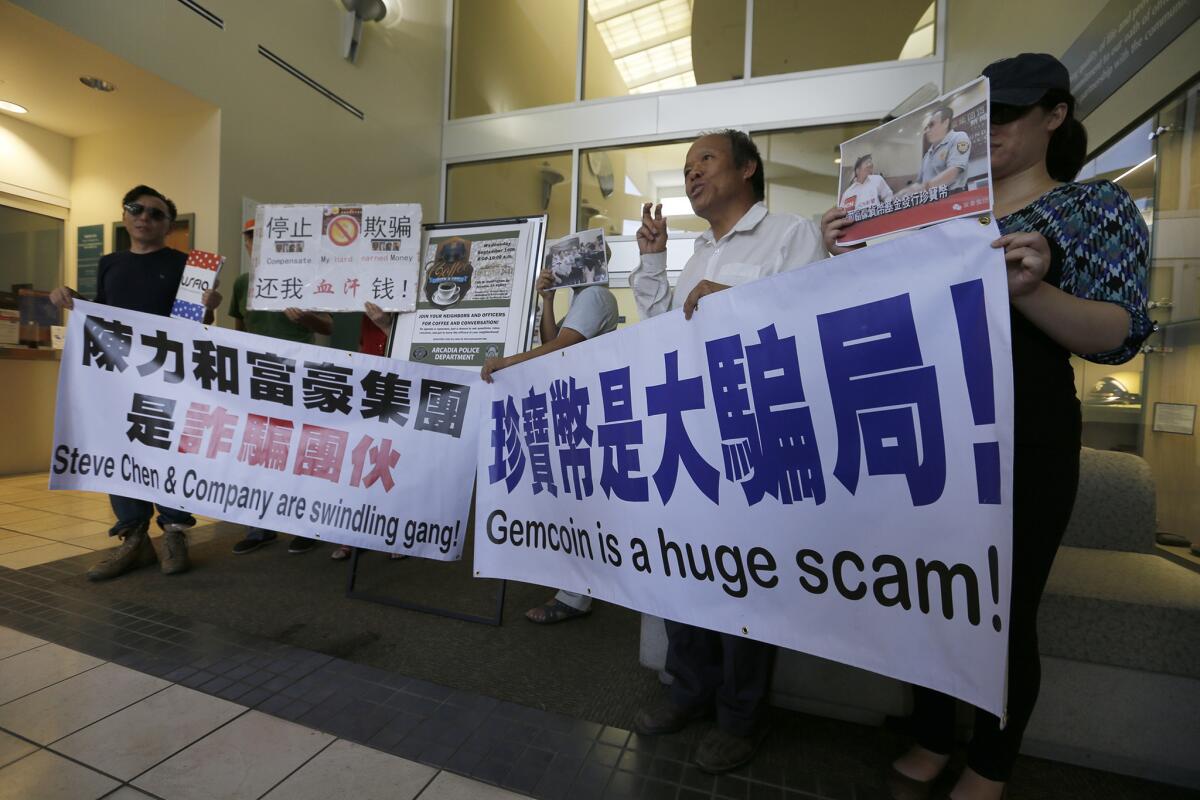Arcadia Councilman John Wuo resigns amid Gemcoin digital currency controversy

As they file reports with Arcadia police on Sept. 10, Michael Liu, second from right, and other Gemcoin investors hold banners warning potential investors.
- Share via
Following the launch of state and federal investigations into a digital currency and amber retail company he had spoken favorably about, Arcadia Councilman John Wuo has resigned, city officials announced at a council meeting Tuesday night.
Wuo had appeared in multiple YouTube videos promoting a digital currency called Gemcoin on behalf of the Arcadia-based company U.S. Fine Investment Arts. The Securities and Exchange Commission filed suit last month, claiming the company was a pyramid scheme. The company is also under investigation by the FBI and the state Department of Business Oversight.
Wuo wasn’t named in the state or federal cases, but on Monday a disgruntled investor filed suit against Wuo, USFIA and several other associated individuals in Los Angeles Superior Court, alleging fraud and negligent misrepresentation.
------------
FOR THE RECORD: A previous version of this article said that a group of investors had filed the Monday lawsuit. It was a single investor, though class-action status is being sought.
------------
Wuo had faced increasingly intense scrutiny in the weeks after a Times report on his appearances on behalf of USFIA. Residents had openly called for his resignation, and one group dissatisfied with Wuo’s stance on mansionization in the city had already began preparations for a recall effort.
Wuo did not appear at Tuesday’s meeting, but Mayor Gary Kovacic read a letter from the councilman announcing his resignation at the meeting’s start, according to David Arvizu, a representative of a group calling for Wuo’s resignation who was present at the meeting.
The investor’s suit filed Monday alleges that Wuo and executives at USFIA committed fraud, negligent misrepresentation and breach of contract, among other claims.
The suit comes a week after U.S. marshals raided USFIA’s offices and a federal judge froze the assets of the company and its chief executive, Steve Chen.
The Securities and Exchange Commission sued Chen, USFIA and a number of associated companies and individuals in September. That filing accuses the company of fraudulently raising millions from local and overseas investors by promoting a digital currency called Gemcoin, which the company touted as an improvement on bitcoin.
The FBI and the California Department of Business Oversight are each investigating cases related to Chen and USFIA. The Arcadia Police Department is also investigating claims that USFIA executives made death threats to keep disgruntled investors quiet.
Wuo is not named in the SEC filing, but Long Liu, the attorney representing the investor in the lawsuit, said he believes Wuo was closely involved because of how favorably Wuo speaks of Gemcoin in promotional videos online. In videos that have since been taken off the Internet, Wuo calls Gemcoin a “breakthrough in finance” and speaks about its positive potential for the U.S. economy.
“If we don’t name him as a defendant in the lawsuit,” Liu said, “it would be borderline legal malpractice.”
Wuo has told the Los Angeles Times that he was not involved with Gemcoin and that his likeness was used without his permission. He did not respond to recent requests for comment.
Incorporation records filed with California’s secretary of state show Wuo was at one point listed as a partner in a separate entity that shared a business address with USFIA called 24 HD Surveillance. These records also state that Wuo and one of the six defendants named in the Gemcoin suit were partners in a real estate business called Golden Apple Group International.
The investor, who is not identified because he fears retribution, the complaint states, alleges that Gemcoin is a pyramid scheme and that the currency’s promoters lied about their business and political credentials and created a false impression that the currency was endorsed by the U.S. and Chinese governments.
According to the complaint, he first invested in the business after a visit to the Arcadia office of USFIA in January 2014. He was taken through a lobby with ATMs that he was told were for exchanging Gemcoins, and was led into a showroom with displays of amber rocks and jewelry, the complaint alleges.
He was especially impressed by Gemcoin’s purported endorsements from Wuo, who was represented as a U.S. congressman, and Solomon Yang, who he was told was both the nephew of Chinese President Xi Jinping and the son of Baibing Yang, former central military commissioner of the Communist Party, the complaint alleges.
Over the next year, he attended two investment seminars at which he was encouraged to recruit as many new investors as possible so that he could collect commissions on their investments, the complaint says.
But later he appraised his amber and found that it was mostly worthless. When he tried to get his money back, he found that his Gemcoins had very little value and was told that he couldn’t withdraw his money, the complaint says.
At his news conference, Liu displayed pictures and videos he said the company created to bolster its political and business credentials and impress investors.
A video, set to a pounding action movie soundtrack, shows a man using a debit card to withdraw cash from a Gemcoin-branded ATM. Another series of photos, which Liu said were altered, showed Yang meeting with a series of world leaders. Other photos, which Liu said executives showed to prospective investors, depicted famous actors such as Jet Li wearing amber jewelry purportedly bought from USFIA.
“These can’t possibly be true,” Liu said.
USFIA executives did not answer requests for comment.
The lawsuit, which seeks class-action status, asks for the return of the lost money, no less than $100 million in damages, and additional fines and penalties to be decided in court.
Twitter: @frankshyong
More to Read
Sign up for Essential California
The most important California stories and recommendations in your inbox every morning.
You may occasionally receive promotional content from the Los Angeles Times.














